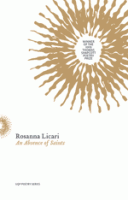 An Absence of Saints by Rosanna Licari
An Absence of Saints by Rosanna Licari
University of Queensland Press, 2010
An Absence of Saints is one of those poetry collections you pick up and immediately sense all the effort and dedication that has gone into making it, the reader easily recognising those long hours that have since stretched into years where the poet shaped and reshaped poems to then be brought thoughtfully together into a manuscript of common themes. So, it is little wonder then that An Absence of Saints was winner of the 2009 Arts Queensland Thomas Shapcott Poetry Prize.
Rosanna Licari – the Brisbane-based poet and editor of the online magazine Stylus Poetry Journal, for whom this is the debut collection – and the team at University of Queensland Press have produced a vigorous and handsome book of fifty-six poems. Divided into three parts, An Absence of Saints explores the deep well of family history, discovery, travel and migration. At the heart of the collection is Licari’s interpretive look at memory. She describes this best in ‘Mediterranean Mosaic’:
Memory is made of fragments or perhaps
lies in the interstices?
But I try to make meaning of the pieces,
and rack through tile shards in this half-light of doubt.
Part one of the collection is titled ‘Istria’, after the peninsula in the Adriatic Sea where Licari’s family originates. The book begins with a tale about her grandmother’s fig orchard in 1939. It feels precarious to start the volume at this time, even more so because Licari mixes it with the idyll of children who are oblivious to the approach of war (‘My Grandmother’s Orchard, Istria, 1939’). This and subsequent poems capture family members in often filmic style, where Licari’s mother or her stories weave in and out of the pages. Licari takes the interesting step of not placing these pieces chronologically, but rather threading one poem’s theme subtly so that it loops into the next poem again and again in order to create a strong backbone for the collection.
Part two, ‘Botany Bay’, contains personal poems that are interspersed with the journals of Sir Joseph Banks and Captain James Cook. The poet’s own voyage to the New World is aptly explored. Here, the reader encounters Licari finding her small, childish feet in Sydney. Acclimatisation to her new home brings parallels with the Endeavour crew to highlight the strangeness of a foreign land and the people that inhabit it. A poem about learning English (‘Strangers’) is sensitively placed next to a journal entry of Joseph Banks who writes of encountering an family in his wanderings (‘Hunters and Collectors’). The similarity of Licari’s experiences shows us how little things have changed for the wide-eyed newcomer and how fully entrenched the human condition is. The poems in this section of the volume are full with life, characters, secrets, grief, loud rooms and quiet beaches, aptly illustrated in ‘Lineage’:
A dull song floats
over the table,
I sit with my family’s women,
black scarf tight around my head.In groups they tell stories
solitary as a wail,
serving the rules by the spoonful
I watch them sink to the bottom of coffee cups.
Part three, ‘Lazarus at the Beach’ takes a turn into entrenched adulthood and explores an unsettled and restless landscape of travel and life in Queensland, Byron Bay, Europe and Asia. Licari also delves into the intimacy of several relationships. The ground beneath is often uncertain and occupied with confusion. Lovers, death and the act of not forgetting are imperative. The symbolism of Lazarus, cyclones and emotional turmoil reinforce disquiet. In ‘Cyclone’:
The day is more solitary than night –
a wideness filled with the vortex of questions.I don’t reach conclusions,
only the silence in pauses.The smell of water ignites the dance of ants
moving in circles.The thunderhead approaches and
a centipede coils into a spiral.The eye is coming.
Licari then heads to Croatia in 1995 (‘In the East the War Continues, Croatia, 1995’). This is deftly handled and helps link back to her World War Two poems and the discussions of death that are interspersed throughout the volume.
The University of Queensland Press produce such attractive collections and An Absence of Saints is no exception. However, this book is made all the more interesting by wide stanza poems being presented in landscape format. It is an interesting and bold decision that works and adds value to the overall feel of the book.
In ‘A Note for the Past’ the poet explains that “forgetting is not made / of the present.” An Absence of Saints is anything but forgetting. It is an archive of thought, observation and feelings. It is also a body of work that is full of muscle, heart and philosophy. It stands tall and has an assured voice that is powerful and impressive. I look forward to reading Licari’s next book.













